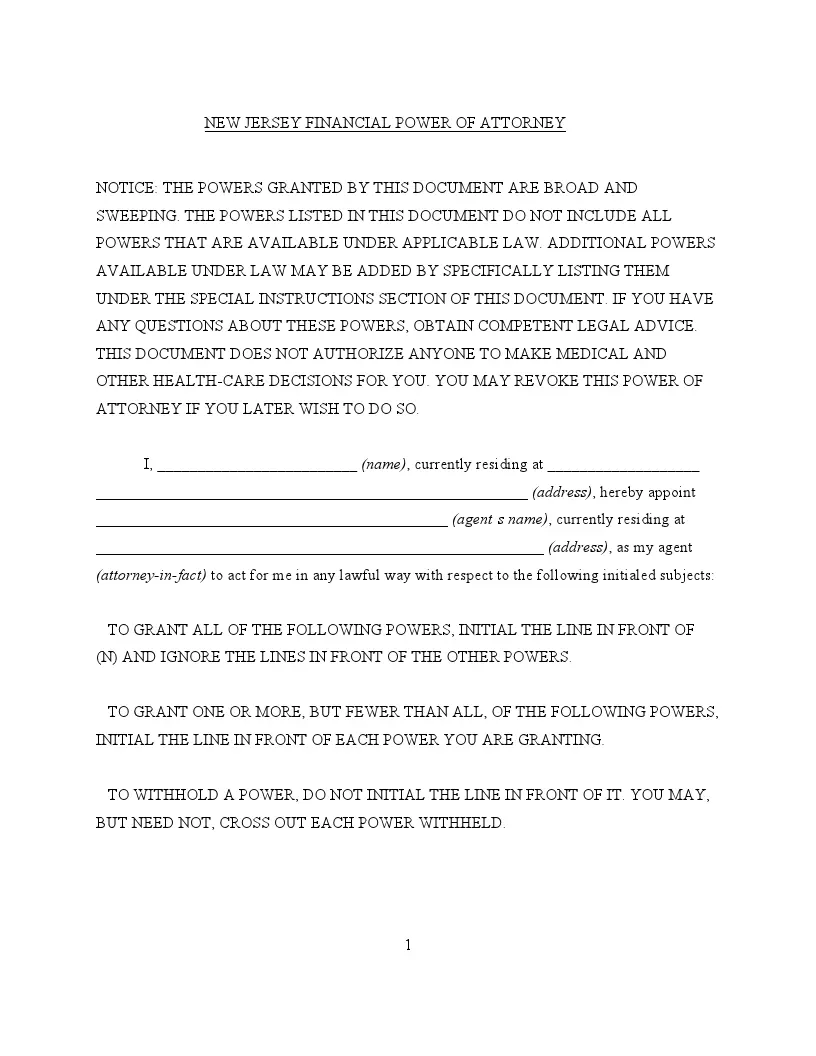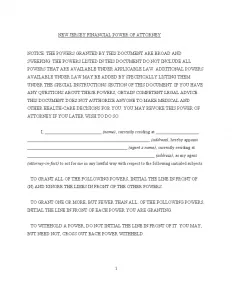New Jersey General Financial Power of Attorney Form
The New Jersey general financial power of attorney is a legal document allowing one person (the principal) to grant another person (the agent or attorney-in-fact) the authority to make decisions and act on their behalf. This power can cover various activities, such as managing finances, buying or selling property, and handling business transactions.
The powers granted by a general power of attorney in New Jersey are broad and can encompass almost any act the principal could do themselves, except for non-delegable duties, such as making a will. It’s important to note that the authority granted through this document typically remains in effect unless the principal becomes incapacitated. At this point, a general power of attorney would no longer be valid unless it is expressly stated to be durable.

Build Your Document
Answer a few simple questions to make your document in minutes
Save and Print
Save progress and finish on any device, download and print anytime
Sign and Use
Your valid, lawyer-approved document is ready
In New Jersey, the laws governing a General Power of Attorney are detailed in the New Jersey Statutes, Sections 46-2B-8.1 to 46-2B-19. This legal framework outlines that a power of attorney must be a written document where the principal designates a person or a qualified bank as their attorney-in-fact. This attorney-in-fact is then authorized to perform specific acts on behalf of the principal.
When creating a general power of attorney, the principal must specify the agent’s powers. The principal must sign the filled POA form, and New Jersey law requires it to be notarized. Additionally, under Section 46:2B-8.11, any third party presented with a power of attorney may rely upon a photocopy or a certified copy of the original signed document.
New Jersey General Power of Attorney Form Details
| Document Name | New Jersey General Power of Attorney Form |
| Other Name | New Jersey Financial Power of Attorney |
| Relevant Laws | New Jersey Statutes, Sections 46-2B-8.1 to 46-2B-19 |
| Avg. Time to Fill Out | 10 minutes |
| # of Fillable Fields | 41 |
| Available Formats | Adobe PDF |
Filling Out New Jersey General (Financial) POA Form
This document should be filled out carefully to ensure your wishes are followed. Below is a step-by-step guide to help you accurately complete the New Jersey general power of attorney form.
1. Principal’s Information
At the top of the form, enter your full legal name and current residential address where indicated. This first part identifies you as the principal granting the power of attorney.
2. Appoint Your Agent
Specify the full name and address of the person you appoint as your attorney-in-fact (agent). This individual will have the authority to act on your behalf according to the powers you grant.
3. Grant Specific Powers
You will see a list of powers from (A) to (N), each representing different areas of authority you can grant to your agent. Mark next to each power you wish to grant. If you want to grant all listed powers, initial next to (N) and ignore the rest.
4. Special Instructions
In the “Special Instructions” section, you can add specific conditions or limitations to the powers granted. This section allows you to customize the powers and provide detailed guidance on how they should be used.
5. Set the Effective Date
Determine when the power of attorney will come into effect. You can choose whether it will be effective immediately or commence on a specific future date. Initial the appropriate line to indicate your choice.
6. Decide on Termination
Choose how the power of attorney will end. Options include revocation by you, a specific date, or if you are determined to be incapacitated. Again, initial next to the chosen condition.
7. Execution
At the end of the document, sign and date the form in the presence of a notary. This step formalizes the power of attorney and makes it legally binding.
8. Notarization
The last step is to have the form notarized. This part typically involves signing the document in front of a notary public who will verify your identity and witness the signing. The notary will then seal the document, confirming its authenticity.
